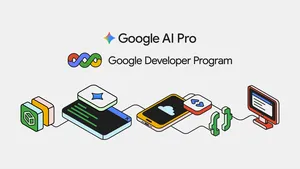Funding Black founders fuels generational change
As part of a series of racial equity commitments made in June, we announced the Google for Startups Black Founders Fund, a $5 million initiative to provide cash awards up to $100,000 to Black led startups in the US. These awards are non-dilutive, meaning that unlike most investments, founders are not giving up any ownership in their company in exchange for funding.
Today, we’re announcing the 76 inspiring founders who have been selected to receive awards from the Black Founders Fund. They’re building incredible startups solving tough problems such as helping Americans get out of debt, ensuring that towns have access to clean drinking water and making our healthcare system more accessible. We interviewed every recipient and asked them the same question: What happens when you fund Black founders? And despite varied backgrounds, missions and motivations, when we asked that question, we saw some clear themes emerge in their answers.
When you fund Black founders, you:
Bring different perspectives to old and new challenges. Whether it's creating technology to form stronger bonds between teachers and parents or using data analytics to help small businesses thrive, Black founders approach big problems for their communities and our world in a way that no one else can.
Level the playing field and build momentum for success. Black founders are consistently locked out of access to early capital that is critical to jump-starting their businesses. With better access to capital early in their journey, founders can make critical hires and prove traction, setting their business up for sustained success. “I can't tell you how many times I've seen other companies that had less traction than us raise more money at higher valuations,” Qoins's Nate Washington tells us, “because they had family or friends funding to get them started.”
Fuel wealth generation and create equal access to economic opportunity. Founders, of course, want success for their businesses. But almost all of the recipients that we spoke with are building their startups in order to ultimately give back to their communities and to pave the way for the next generation of Black founders.
In the U.S., less than one percent of venture capital goes to Black founders. Racial equity is inextricably linked to economic opportunity around the world, and that’s why we’ve also announced funding to support Black founders in Brazil and across Europe. We know that hands-on support and connections are necessary elements to any founder’s success. With these funds, we are also committing to growing a relationship that brings these founders the best of Google.
“When Black founders get funding, we will see the wealth gap get closed in the United States and across the world. You can bet I’ll be paying it forward.” —Harold Hughes, Bandwagon
“With MindRight Health, one of the core things in the back of my mind as I'm building this is: How can I get this to a place where we can create that ripple effect? We can generate wealth for our communities, for the people that we serve.”—Ashley Edwards, MindRight Health
“Part of my goal in building this company is to have other Black founders in Chicago succeed in building large category-defining companies in this city. When Black founders get funding, an entirely new generation of entrepreneurs changes what is possible for themselves.” —Ablorde Ashigibi, 4Degrees
“My son sees the sensors and the stuff in the house, in the garage, and knows his father is building a business that is helping people drink clean water. He's proud of me and sees possibility for himself. Frankly, if I know we will have more impact, but if my two boys see that and it opens up the world to them, then truly my job is done.” —Jamail Carter and Seyi Fabode, Varuna
“We're an ingenious people. We've had to be to survive and so when we get a little leg up, we go a long way with it. When Black founders get funded, we put it to really good use. We’re talking about generational wealth that can transform communities.” —Sonja Ebron, Courtroom5
“It's so amazing when you see a young person's eyes light up at the possibilities of what can be. You start to see this shift in the way that they talk about themselves, the way that they think about themselves. And for me, there's nothing more powerful than that. Than expanding a young person's mind and understanding of what's possible and who they can be.” —Jakita Thomas, Pharoah’s Conclave







